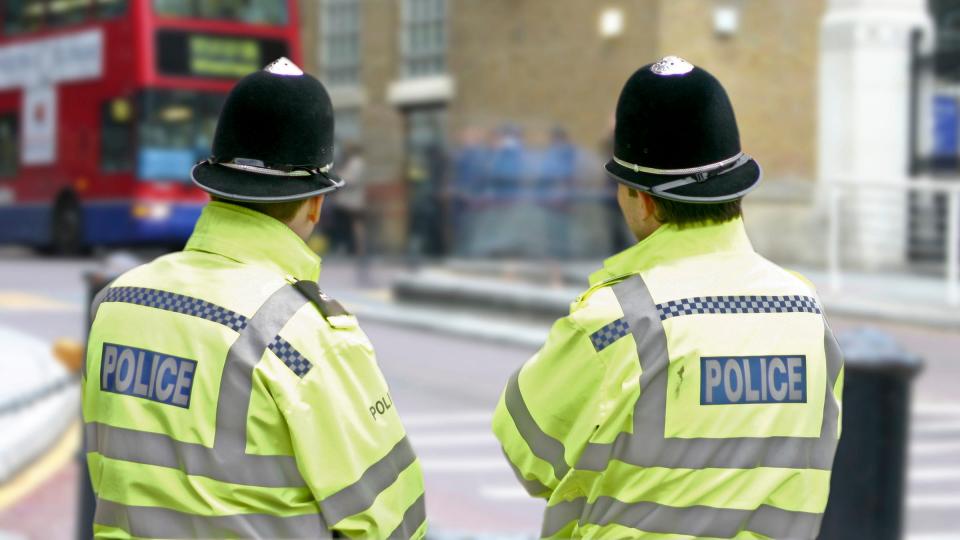- Postgraduate
Policing MSc
Overview
Learn to be strategic as you respond to the modern challenges of policing with MSc in Policing.
This course provides you with a transformative learning experience that responds to the changing needs of society.
You can study MSc Policing or choose to specialise in the following pathways:
- MSc Policing
- MSc Policing (International Policing)
- MSc Policing (Investigating Serious Crime)
- MSc Policing (Leadership and Management)
All pathways will challenge you to stretch your strategic and critical thinking and to gain the knowledge, skills and competencies to create innovative and sophisticated responses.
You will learn to deal with threats such as:
- cybercrime
- violence against women and girls
- terrorism
- organised crime
- other emerging risks to public protection.

Select your desired study option, then pick a start date to see relevant course information:
Start date:
If your desired start date is not available, try selecting a different study option.
Why study Policing with us?


What our students say…
I'd describe my university experience as absolutely fantastic. The atmosphere and being around like-minded people was my favourite aspect of university life.The tutors were great.




Course detail & modules
This policing degree will focus on work within diverse and complex communities. The core course content prepares you for:
- community working
- valuing diversity
- championing inclusion
- ensuring equality
- safeguarding
- following ethical policing practice.
The course also offers you the flexibility to specialise in one of the pathways below:
- MSc Policing
- MSc Policing (International Policing)
- MSc Policing (Investigating Serious Crime)
- MSc Policing (Leadership and Management)
This pathway focuses on the criminal and forensic side of policing and is intended for:
- police officers considering progressing their careers into these specialist areas
- individuals from community safety and policing fields who wish to develop into specialist roles
- those involved in advanced study of policing for instance those who have completed the undergraduate degree in policing and wish to take their learning further.
MSc Policing (International Policing)
This pathway provides a transformative learning experience that responds to the changing needs of policing from an international perspective. The MSc in International Policing is intended for:
- police officers considering progressing their careers into specialisms or for promotion and others with an interest in studying policing as an academic or researcher
- individuals from community safety and policing fields who wish to develop into specialist roles
- those involved in advanced study of policing for instance those who have completed the undergraduate degree in policing and wish to take their learning further.
MSc Policing (Leadership and Management)
This pathway will enable you to use a range of techniques and research methods in order to improve and enhance professional policing practice. This pathway is aimed at those in senior leadership roles who want to improve their capability as police leaders.
You will develop the ability to:
- deal with complex issues within policing, both systematic and creative
- make sound evidence-based judgements and communicate their conclusions clearly to diverse audiences
- demonstrate self-direction and innovative approaches to solving problems
- act autonomously in planning and implementing tasks at a Superintendent, strategic or equivalent level.
MSc Policing (Investigating Serious Crime)
This pathway will help you gain insight into the area of serious crime and enhance your crime-solving skills. You will undertake a learning experience that covers key areas of the National Policing Curriculum (NPC), and integrates the Policing Education Qualifications Framework (PEQF) and the Chartered Manager standard.
You will critically examine the issues of investigating serious crime considering how technological, societal and criminal challenges are creating a new context to police legitimacy and effectiveness. You will be able to use a range of techniques and research methods in order to improve and enhance your professional policing practice.
This degree course will enable you to develop the skills and capabilities to lead and manage complex operations, teams and organisations in order to achieve effective and ethical policing outcomes.
You will need to complete the listed compulsory modules, as well as pick ONE course pathway. The chosen pathway will have additional optional modules you will need to complete.
MSc Policing
- Criminal Investigations
- Police Leadership and Management
- Criminal and Forensic Psychology.
MSc Policing (International Policing)
- International Policing.
MSc Policing (Investigating Serious Crime)
- Criminal Investigations.
MSc Policing (Leadership and Management)
- Police Leadership and Management.
Compulsory modules
-
Evidence Based Approaches to Policing
-
Contemporary Policing: Legitimacy and Performance
-
Dissertation
The module builds on content covered in ‘Research Methods’ and focuses on preparing you to undertake a major research project in the area of policing.
You will learn a number of research methods skills workshops to deepen your knowledge of research methodologies relevant to the topic of the research, the relationship between theory and research, data collection techniques and their limitations, evaluation and writing style conventions consistent with reporting research.
-
Research Methods
The aims of the module are to provide advanced training in how to conduct research in the context of policing and to prepare you for the completion of a dissertation. The module will also:
- develop competence in research design, data collection and analysis, and writing up a research proposal
- provide advanced training in a range of practical research skills, techniques and designs
- allow you to gain an understanding of how to evaluate and select appropriate evidence from a range of electronic databases
- foster your self-direction and originality in tackling and solving research problems, and their ability to act autonomously in planning and implementing a programme of research at Masters Level
- integrate research methodology and data analysis with the theoretical, applied and professional topics addressed throughout the MSc Policing.
Entry requirements
You should have an honours degree (2:2 or above) from a UK university or equivalent. We may also offer you a place based on relevant experience or training, normally from within the work environment. All applications are considered individually.
You need to meet our English language requirement - a minimum of IELTS 5.5 for each of the 4 individual components (Reading, Writing, Speaking and Listening). We also accept other examination equivalents. Contact our International Office to find out more.
You also need academic qualifications at the same level as UK applicants. In some countries where teaching is in English, we may accept local qualifications. Check for local equivalents.
We offer pre-sessional English language courses if you do not meet these requirements. Find out more about our English Language courses.
We look for students who show enthusiasm and a passion for the subject through previous study or professional experience.
If you have any questions about the relevance of your qualifications or experience please contact the course leader shown in the teaching staff.
You need to meet our English language requirement of 6.5 overall score for IELTS, with a minimum of 5.5 for each of the 4 individual components (Reading, Writing, Speaking and Listening). Visit our English language requirements page for information on other English language tests we accept.
You also need academic qualifications at the same level as UK applicants. In some countries where teaching is in English, we may accept local qualifications. Check for local equivalents.
We offer pre-sessional English language courses if you do not meet these requirements. Find out more about our English Language courses.
We look for students who show enthusiasm and a passion for the subject through previous study or professional experience.
If you have any questions about the relevance of your qualifications or experience please contact the course leader shown in the teaching staff.
Teaching staff

Professor Graham Brooks
Professor Graham Brooks specialises in corruption in an international context. Often asked to present at academic and professional conferences Prof Brooks has been plenary speaker at the Cabinet Counter Fraud Conference 2012, Key Note speaker at European Healthcare Fraud and Corruption Network (EHFCN) 2015, in The Hague and in Athens in 2018.
Professor Brooks was also invited to be part of United Kingdom Cabinet Office Round-Table discussion on anti-corruption in 2016, and workshops run by the Royal United Services Institute (RUSI) on ‘Measuring the Scale of Money Laundering in the United Kingdom (2018, London) and ‘Anti-Money Laundering (AML) responses in online businesses (London, 2019).
Professor Brooks has also been Assistant Director Centre for Counter Fraud and Corruption whilst working at the University of Portsmouth and Secretariat of Counter Fraud Accreditation Board, and a Community Safety Officer in his career so far, and is currently a member of the Group of Experts for EHFCN.
Professor Brooks has secured funds from public and private sector and recognised international research bodies to research an array of criminal justice issues and published numerous books and papers in international journals with colleagues in the United Kingdom, Australia, South Korea, Taiwan, Japan, Cyprus and Dubai.
Professor Brooks has recently published Criminal Justice and Corruption: State Power, Privatization and Legitimacy (Palgrave) in 2019.
Professor Brooks is currently co-investigator on a United Kingdom-Japan connections call (2019/2020) ‘Towards the development of a framework for the interviewing of vulnerable people by the police in Japan’ funded by the ESRC.
Professor Graham Brooks specialises in corruption in an international context. Often asked to present at academic and professional conferences Prof Brooks has been plenary speaker at the Cabinet Counter Fraud Conference 2012, Key Note speaker at European Healthcare Fraud and Corruption Network (EHFCN) 2015, in The Hague and in Athens in 2018.
Professor Brooks was also invited to be part of United Kingdom Cabinet Office Round-Table discussion on anti-corruption in 2016, and workshops run by the Royal United Services Institute (RUSI) on ‘Measuring the Scale of Money Laundering in the United Kingdom (2018, London) and ‘Anti-Money Laundering (AML) responses in online businesses (London, 2019).
Professor Brooks has also been Assistant Director Centre for Counter Fraud and Corruption whilst working at the University of Portsmouth and Secretariat of Counter Fraud Accreditation Board, and a Community Safety Officer in his career so far, and is currently a member of the Group of Experts for EHFCN.
Professor Brooks has secured funds from public and private sector and recognised international research bodies to research an array of criminal justice issues and published numerous books and papers in international journals with colleagues in the United Kingdom, Australia, South Korea, Taiwan, Japan, Cyprus and Dubai.
Professor Brooks has recently published Criminal Justice and Corruption: State Power, Privatization and Legitimacy (Palgrave) in 2019.
Professor Brooks is currently co-investigator on a United Kingdom-Japan connections call (2019/2020) ‘Towards the development of a framework for the interviewing of vulnerable people by the police in Japan’ funded by the ESRC.
Study & career progression

Graduates of this programme will be well placed to take on specialist or leadership roles in:
- policing
- community safety
- criminal justice
- research into police and society.
It will be particularly relevant for anyone considering a role within police education.
How to apply

You can apply online at any time by following the link below.
Our application form will ask you for some information about:
- what you want to study
- your previous qualifications or experience
- your references
- how we can contact you.
Want to ask us a question first? We would love to hear from you. Contact us free on:
- 0800 036 8888
- courses@uwl.ac.uk
Apply for this course
Next steps after making your application
We aim to make a decision on your application as quickly as we can. If we need any more information about your qualifications, we will be in touch.
In the meantime, come and visit us and find out more about what studying at UWL is like. Sign up for an open day or join a campus tour.
Visit us and see for yourself
Talk to our tutors and find out about our courses and facilities at our next open day or join a campus tour.
We're here to help
Any questions about a course or studying at UWL? We're here to help - call us on 0800 036 8888 (option 2, Monday – Friday 10am-4pm) or email us on courses@uwl.ac.uk.
Our postgraduate prospectus
All of our courses in one place - download now or order a hard copy.

You can apply online at any time by following the link below.
Our application form will ask you for some information about:
- what you want to study
- your previous qualifications or experience
- your references
- how we can contact you.
Want to ask us a question first? We would love to hear from you. Contact us free on:
- 0800 036 8888
- courses@uwl.ac.uk
Apply for this course
Next steps after making your application
We aim to make a decision on your application as quickly as we can. If we need any more information about your qualifications, we will be in touch.
In the meantime, come and visit us and find out more about what studying at UWL is like. Sign up for an open day or join a campus tour.
Visit us and see for yourself
Talk to our tutors and find out about our courses and facilities at our next open day or join a campus tour.
We're here to help
Any questions about a course or studying at UWL? We're here to help - call us on 0800 036 8888 (option 2, Monday – Friday 10am-4pm) or email us on courses@uwl.ac.uk.
Our postgraduate prospectus
All of our courses in one place - download now or order a hard copy.

You can apply online at any time by following the link below.
Our application form will ask you for some information about:
- what you want to study
- your previous qualifications or experience
- your references
- your visa (if required)
- how we can contact you.
Want to ask us a question first? Our dedicated international students’ team would love to hear from you.
- email international@uwl.ac.uk to submit a question
Apply for this course
Next steps after making your application
We aim to make a decision on your application as quickly as we can. If we need any more information about your qualifications, we will be in touch.
In the meantime, come and visit us and find out more about what studying at UWL is like. Sign up for an open day or join a campus tour.
Visit us and see for yourself
Talk to our tutors and find out about our courses and facilities at our next open day or join a campus tour.
We're here to help
Any questions about a course or studying at UWL? We're here to help - call us on 0800 036 8888 (option 2, Monday – Friday 10am-4pm) or email us on courses@uwl.ac.uk.
Our postgraduate prospectus
All of our courses in one place - download now or order a hard copy.
Search for courses
Student life at UWL
Important notes for applicants
Disclaimer
*Modern universities - defined as higher education institutions that were granted university status in, and subsequent to, 1992.
**The National Student Survey 2023 and 2024 - Average of answers to all questions by registered student population. Excludes specialist institutions.
Testimonials - our students or former students provided all of our testimonials - often a student from the course but sometimes another student. For example, the testimonial often comes from another UWL student when the course is new.
Optional modules - where optional modules are offered they will run subject to staff availability and viable student numbers opting to take the module.
Videos - all videos on our course pages were accurate at the time of filming. In some cases a new Course Leader has joined the University since the video was filmed.
Availability of placements - if you choose a course with placement/internship route we would like to advise you that if a placement/internship opportunity does not arise when you are expected to undertake the placement then the University will automatically transfer you to the non-internship route, this is to ensure you are still successful in being awarded a degree.







